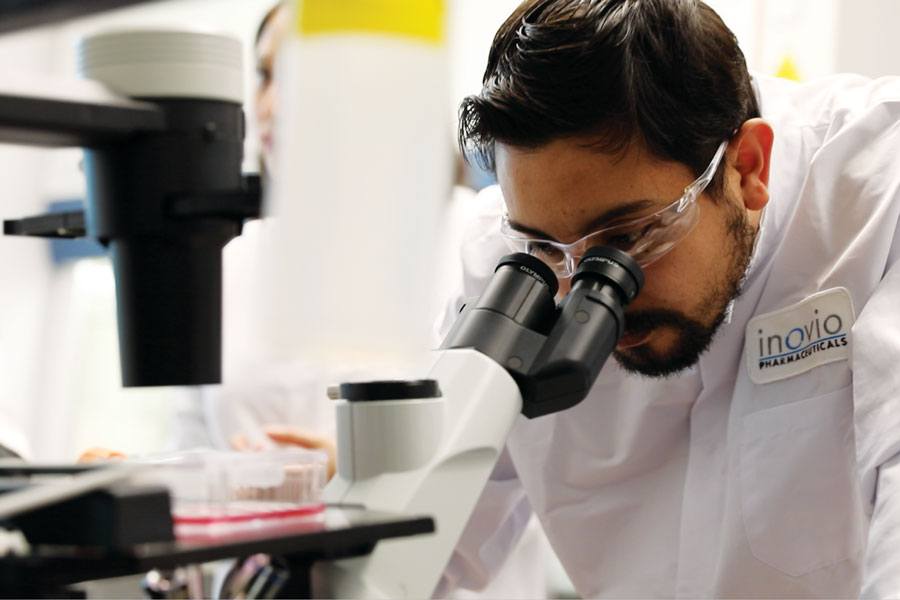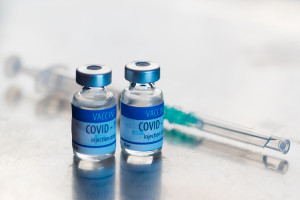It’s November and We Still Don’t Have a Coronavirus Vaccine
Here’s a look at how far Philly companies have gotten in the development process — and how far there is yet to go.

Inovio Pharmaceuticals is one local company working towards developing a COVID-19 vaccine. Photograph courtesy Inovio Pharmaceuticals
It’s finally Election Day.
It’s also the day by which some said a COVID-19 vaccine would be ready. Spoiler alert: We still don’t have a vaccine. Experts had already told us why politicizing a cure for the virus by tying it to the election was a bad idea and the nation’s top health expert, Anthony Fauci, called the target date “unlikely.” But that didn’t stop Donald Trump from touting this as a promise on the campaign trail. Needless to say, we’re just not there yet. In fact, the development of a coronavirus vaccine has proven to be more difficult than expected.
There are already questions about how durable an immune response any of the vaccines in development might be able to produce since we’re seeing evidence that people can be reinfected with COVID-19 and the antibodies that the body creates to fight the virus wear off over time. Three COVID-19 trials have been paused, a self-imposed halt that researchers apply if trial participants show troubling symptoms. And in October, a participant in AstraZeneca’s COVID-19 trial in Brazil died, though it was later reported that the participant had not received the experimental vaccine.
While pauses and deaths during clinical trials are not uncommon, they illuminate the challenges of bringing any new vaccine to market, let alone one with as elusive a target as SARS-CoV-2 appears to be.
So, where are we on the path to a vaccine?
More than 60 coronavirus vaccine trials are currently underway around the globe. Eleven of those are in Phase III, typically the last big hurdle before FDA approval; though this phase alone can take months to complete.
In Philadelphia, several companies and researchers are continuing their journeys toward discovering a cure. Here’s where their efforts are now.
Inovio Pharmaceuticals
In April, we told you how Plymouth Meeting-based biotech company, Inovio Pharmaceuticals, had quickly become a frontrunner among companies with a COVID-19 vaccine being tested in humans. In June, the company released limited data from its Phase I trial showing its vaccine candidate, INO-4800, had triggered an immune response in 34 out of 36 trial participants with no adverse effects. In early September, Inovio announced that it had signed a letter of intent with Thermo Fisher Scientific to manufacture the company’s DNA COVID-19 vaccine candidate and Inovio upped its already ambitious goal of manufacturing one million doses of its vaccine by the end of 2020 to promising it would have 100 million doses manufactured in 2021.
But later that month, the FDA put a partial clinical hold on Inovio’s planned Phase II/III trial before it began. The FDA can put a trial on hold for a number of reasons, including concerns about participants being “exposed to an unreasonable and significant risk of illness or injury.” Inovio explained in a press release that the FDA only imposed the hold because the agency had “additional questions” about the company’s proposed trial and that the hold is “not due to the occurrence of any adverse events” from its Phase I trial.
A company spokesperson told NextHealth PHL that Inovio is “awaiting FDA concurrence to begin its Phase II/III trial for its COVID vaccine INO-4800 which the company expects will be fully funded.”
Inovio addressed the FDA’s questions in October. The FDA has up to 30 days to notify Inovio of its decision as to whether the trial may proceed.
Chimeron Bio
Since the start of Chimeron Bio’s COVID-19 vaccine effort in the summer of 2020, the Philly-based company has identified two vaccine candidates designed on ChaESAR, the company’s proprietary self-amplifying RNA platform (RNA, or ribonucleic acid, is an essential molecule that codes, decodes and regulates genes. In the immune cells, RNA self-amplifies, making multiple copies of itself, which results in an amplified immune response.). The company aims to produce a vaccine that would be able to generate neutralizing antibodies against Sars-CoV-2 using much less RNA material than the vaccines currently in clinical trials.
According to Chimeron Bio CEO Jolly Mazumdar, preclinical data suggests the company’s vaccine candidate could have single-shot potential, as opposed to vaccines that require two shots to produce a maximum immune response. Mazumdar believes Chimeron Bio’s vaccine’s low-dose requirement, speed and ease of manufacturing, and compatibility with existing supply chain paradigms present a huge advantage in the COVID-19 vaccine landscape, and an opportunity to bring forward one of the best globally accessible COVID-19 vaccines.
“While as R&D scientists and vaccine biologists, it has been fascinating to watch the unprecedented progress made in the COVID-19 space, this pandemic has definitely shed light on the need for more superior vaccine platforms that stand ready for rapid deployment globally,” Mazumdar said. “We believe Chimeron Bio’s ChaESAR technology is a truly global platform which paves the way for effective, affordable and accessible vaccines not just for COVID-19, but also for future threats.”
While the effort is still in the pre-clinical trial stage, Chimeron Bio is currently conducting safety studies of the COVID-19 vaccine candidates in lab animals with plans to advance to the clinic in 2021.
Other Vaccine Updates From the Philly Region
Inovio and Chimeron are not the only companies involved in the pursuit of a vaccine for COVID-19. Several other companies and scientists in the region are contributing to the vaccine efforts underway.
- Philly-based pharmaceuticals giant, GlaxoSmithKline (GSK) is lending its pandemic adjuvant technology to Sanofi, a multinational pharmaceutical company headquartered in Paris, France. Sanofi’s vaccine candidate is a combination of the company’s S-protein COVID-19 antigen and GSK’s adjuvants (ingredients added to vaccines to produce a stronger, lengthier immune response to disease). Sanofi began a Phase I/II trial in September. The company expects to have early results from that trial in December to support the launch of a Phase III trial before the end of 2020.
- Integral Molecular continues to share its vaccine development technologies with researchers throughout the region and around the world. The company’s technologies help scientists to identify receptors that allow viruses like COVID-19 to invade cells. Integral Molecular’s technology has already been used to identify multiple receptors used by other viruses including Zika, Ebola, and Chikungunya.
- Several COVID-19 vaccine candidates are being developed using technology created by researchers at Penn, including vaccines being developed by Moderna and BioNTech. James Wilson, a professor of Medicine and director of the Gene Therapy Program and the Orphan Disease Center at Penn, is also collaborating with several institutions on a COVID-19 vaccine using AAV technology invented at the university.
Only time will tell which of these vaccines will be available first, but as case counts continue to rise, it’s safe to say the more vaccine options we have, the better.


